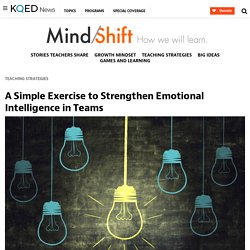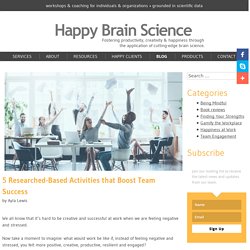

“Safe” teams also thrive in an environment that is, in general, caring and respectful. Project Aristotle found that the safest teams are made up of empathetic individuals, which shouldn’t come as a surprise: it’s easier to trust people when they care about you.
Team members also feel safe when they’re encouraged to contribute to a project’s success. Such encouragement shows each member that he or she is an important part of the group with opinions that are highly valued.
Naturally, team leaders are tasked with fostering this psychological safety. So if you’re a leader, make sure all your team members have their voices heard at least once in every meeting.
If you notice a team member is upset, encourage the person to share what’s wrong and make sure other members respond in a caring way. Resolve any conflicts in the open and never interrupt team members when they are speaking.
The Alchemy of Scaling Teams in Fast-Growing Startups. Anybody who has been part of a small company, or on a small team, and witnessed it as it grew — quickly, sometimes messily — knows that it feels like alchemy.

Alchemy: an explosion of new people that brings in its midst a rush of new names to learn, different personalities, new ways of doing familiar things, and curious skills employed in unknown but needed arts. And, most of all, you’re wondering how to adapt to this change and what, if anything, will remain the same. Before we dive into that further, I should start by introducing myself. I’m the Director of Design at Blinkist — the mobile learning platform that transforms non-fiction titles into compact, accessible key takeaways in text and audio. Back in 2018, I wrote an article about design here at Blinkist. We were a team of five when the article was written last year. Why It’s So Hard to Speak Up Against a Toxic Culture. Executive Summary Frustrated by the behavior of some men in their workplace, a group of women working at Nike anonymously surveyed other women colleagues a few months ago about their perceptions of sexual harassment and gender discrimination at the company.
The results painted a clear picture of a workplace where women often felt marginalized, disrespected, and discriminated against. The survey reached the hands of the company’s CEO. What followed, as covered in the media, indicates the problem is being taken seriously: A few top executives at the firm resigned or are on their way out, and bias training and other remedies are being introduced. Stories like this one about Nike’s toxic workplace culture remind us that speaking up about injustice and being heard in an organization can create positive change. The gesture by the Nike workers may seem dramatic, but it was the result of women being ignored by HR as they voiced their concerns. Emotional At Work? Science Says You'll Be More Productive. What does it take to build a dream team that will skyrocket a company and its members to success?

Experts are looking to one strategy in particular for taking team productivity from good to great: Emotional intelligence, or EQ, a skill that is an increasingly important part of individual and now, group professional development. What Is Emotional Intelligence? At a basic level, emotional intelligence is a person’s ability to identify and manage their emotions appropriately.
EQ has been making inroads into the workplace since the 1990s, but the focus on group development has lagged behind its development as an individual competency. Four Ways Virtual Teams Fail (and How to Fix Them) A scene from an average company, circa 2017: Sandra, a business analyst, comes into the office at 9:00 in the morning, sits down at her desk and checks her email.

She finds a note from Paolo, who works in another country and was hard at work while Sandra was asleep. She forwards an attachment with a few questions to Vera, who works in a satellite office down the street, and then hops onto a call with a contractor based in a distant city. Before she’s finished her first cup of coffee, Sandra has interacted with three teammates, but none of those interactions were face-to-face. Sound familiar? As technology reshapes the nature of our work, it is also reshaping the nature of our teams.
Why ‘business as usual’ is killing team performance.
Meaningful Feedback. Difficult Conversations. Toxic Employee. Team Building. Remote Team. Project Management. Project Management Software. A Simple Exercise to Strengthen Emotional Intelligence in Teams. By Gayle Allen “She needs every detail before we start, and it slows us down.”

“He acts before we agree on a plan, so we make a lot of mistakes.” Sound familiar? These are just some of the frustrations participants share when asked to give feedback on a team experience. And they’re the reasons people often prefer to work alone. Yet it’s been shown that working as a member of an effective team can boost morale and performance. What that means for educators is that emotional intelligence in the form of skills like empathy and collaboration is more important than ever. Quick Preparation This activity is based on the Compass Points protocol developed by members of the National School Reform Faculty, a non-profit professional development site for educators.
To prepare, you’ll want to create the four signs – North, South, East and West – in advance and post them on room walls before you begin. The Activity (Level 1: 20 minutes) 1. Provide time for group members to share out their responses. Try Each Researched-Base Activity to Increase Team Success. We all know that it’s hard to be creative and successful at work when we are feeling negative and stressed.

Now take a moment to imagine: what would work be like if, instead of feeling negative and stressed, you felt more positive, creative, productive, resilient and engaged? According to studies in positive psychology and neuroscience, you can experience these and more benefits by increasing your own happiness and the happiness of those you work most closely with. The research is abundantly clear: happier brains do better work. One way to maximize the happiness and productivity of your team is to specifically set aside time to apply research-based strategies. At Happy Brain Science, we have curated many activities that we facilitate in our workshop The Science of Being Happy and Productive at Work. Activity # 1 – Start Meetings with Recognitions Activity #2 – Go on a Walking One-on-One We all know that exercise is fantastic for brain function and managing stress. According to Dr. The Grove's Team Performance System.
Collective Intelligence. Emotional Intelligence.